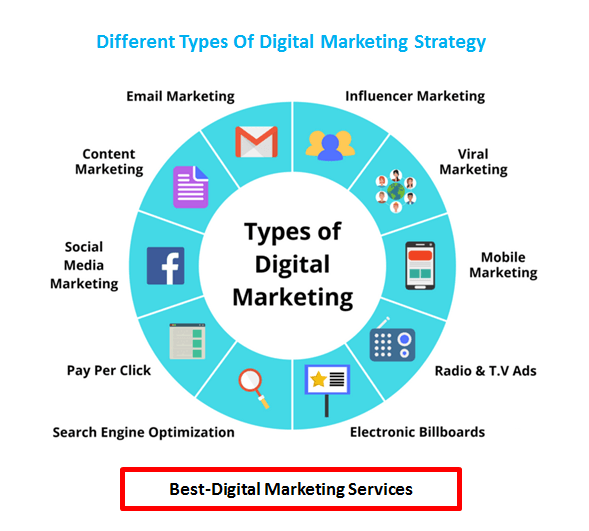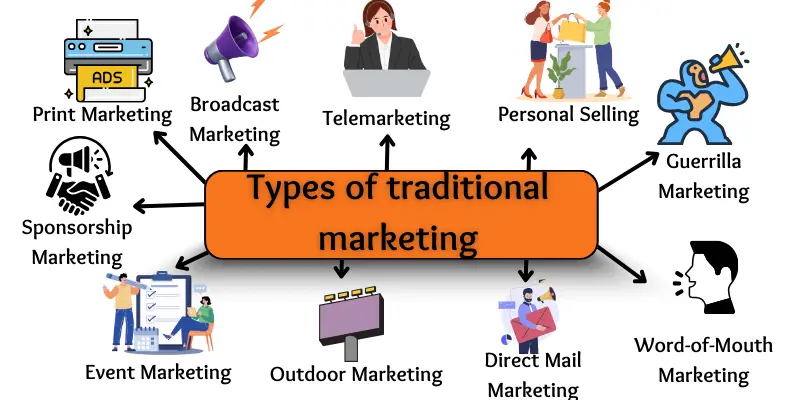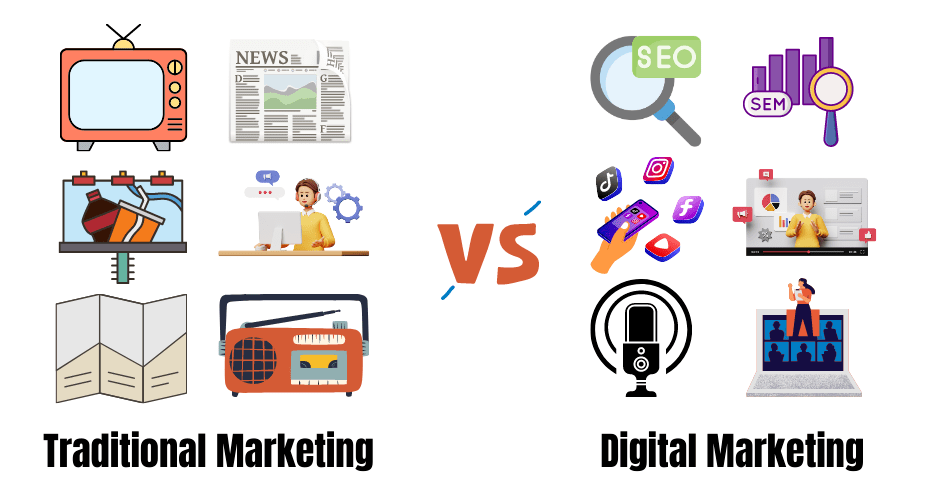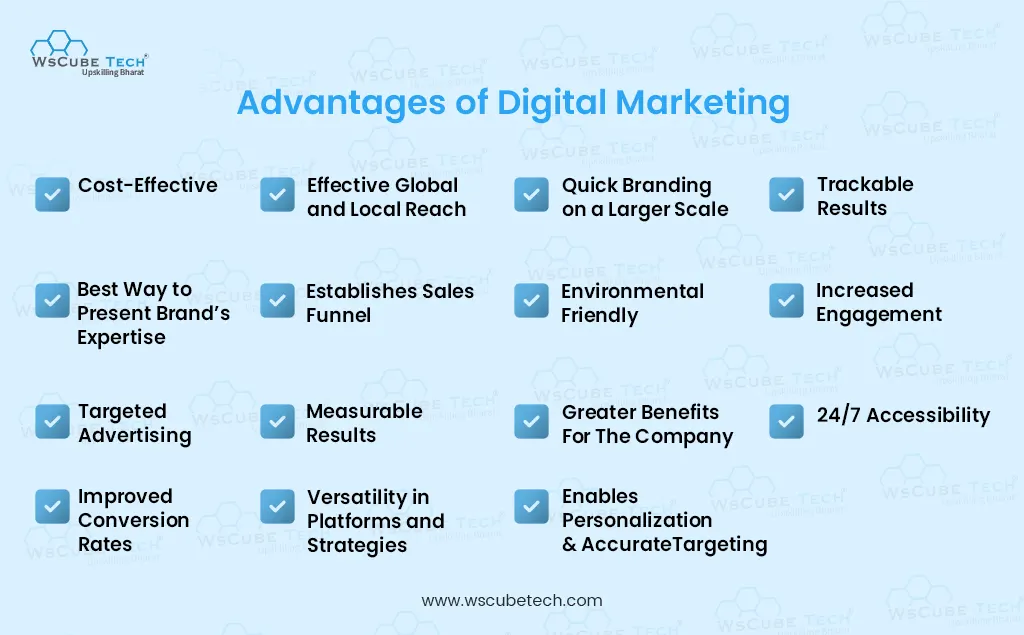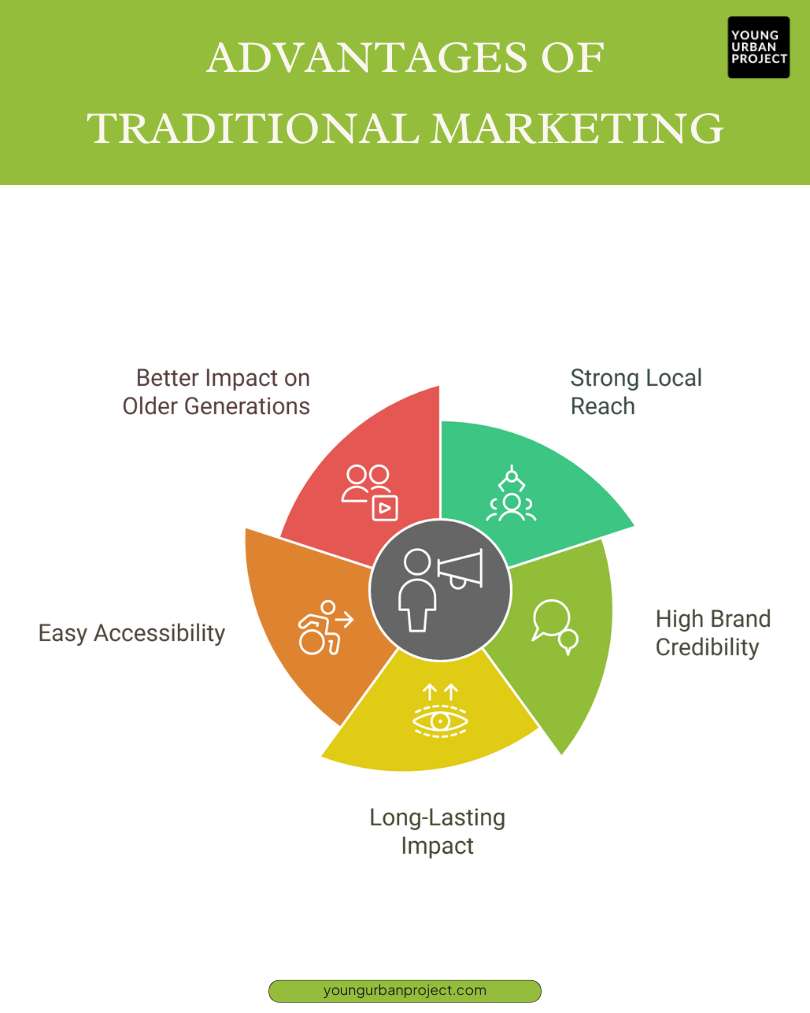The B2B marketing landscape has fundamentally shifted, creating two distinct approaches: traditional marketing and digital marketing. Each methodology offers unique advantages for reaching decision-makers, nurturing business relationships, and building brand authority within professional networks.
By the end, you’ll understand:
What is Digital Marketing in the B2B Context?
What is Traditional Marketing in the B2B Context?
Key Differences between Digital and Traditional Marketing for B2B
Benefits of Digital Marketing for B2B
Benefits of Traditional Marketing for B2B
When to Use Each Type of B2B Marketing Strategy
What is
Digital Marketing
in the B2B Context?
Source: Best Digital Marketing
Digital marketing has transformed B2B communications by enabling precise targeting of business professionals, comprehensive lead nurturing, and detailed performance measurement that traditional methods cannot provide.
LinkedIn marketing has become the cornerstone of B2B digital strategies, offering unparalleled access to professional networks, industry groups, and decision-makers based on job titles, company sizes, and industry sectors. Email marketing automation enables sophisticated lead-nurturing campaigns that deliver personalised content based on prospect behaviours and engagement levels.
Content marketing in B2B contexts focuses on creating valuable resources like whitepapers, case studies, webinars, and industry reports that demonstrate expertise while addressing specific business challenges. Search Engine Optimisation (SEO) ensures that companies appear prominently when prospects search for industry-specific solutions, whilst Pay-Per-Click (PPC) advertising targets high-intent keywords used by business buyers.
Account-based marketing (ABM) represents a sophisticated digital approach that creates personalised campaigns for specific target accounts, combining multiple digital channels to engage entire buying committees. Marketing automation platforms integrate various digital touchpoints, enabling complex nurturing sequences that guide prospects through lengthy B2B sales cycles.
The data-driven nature of digital marketing provides B2B marketers with unprecedented visibility into prospect behaviours, campaign performance, and return on investment (ROI), enabling continuous optimisation and strategic decision-making.
What is
Traditional Marketing
in the B2B Context?
Source: Digital Marketing Guide
Traditional marketing in the B2B space encompasses any form of marketing that doesn’t rely on internet-based platforms, focusing instead on established channels that have long been trusted by business professionals and industry leaders.
Trade publications and industry magazines remain influential in B2B traditional marketing, providing credible platforms where companies can showcase their expertise to targeted professional audiences. Conference sponsorships and trade shows offer invaluable face-to-face networking opportunities, allowing businesses to demonstrate products, build relationships, and establish industry presence.
Direct mail campaigns in B2B contexts often involve sophisticated materials like company brochures, product catalogues, and personalised proposals delivered to specific business addresses. Print advertising in industry journals and professional publications helps establish thought leadership and brand recognition amongst key decision-makers.
Outdoor advertising takes on different characteristics in B2B marketing, often targeting business districts, airport terminals, and conference centres where professionals congregate. Radio sponsorships during business news programmes can effectively reach executives during their commutes, whilst telemarketing enables direct conversations with potential business clients.
The strength of traditional B2B marketing lies in its perceived professionalism and established credibility within business communities. Many senior executives and decision-makers built their careers during periods when these channels dominated, creating comfort levels and trust associations that influence purchasing decisions.
Key Differences between Digital and Traditional Marketing for B2B
Source: Junior to Expert
Understanding how traditional and digital marketing perform in B2B contexts requires examining their effectiveness across critical business-focused criteria:
Lead Generation Quality
Traditional marketing often generates broader awareness but with less qualified leads, whilst digital marketing enables precise targeting that typically produces higher-quality prospects with greater purchase intent. Lead scoring and qualification processes work more effectively with digital campaigns due to the available behavioural data.
Sales Cycle Support
B2B sales cycles often span months or years, requiring sustained engagement with multiple stakeholders. Digital marketing excels at lead nurturing through automated sequences, whilst traditional marketing provides periodic touchpoints that reinforce brand presence during lengthy decision processes.
Decision-Maker Accessibility
Traditional marketing can effectively reach senior executives through industry publications and professional events where they’re already engaged. Digital marketing offers more direct access through LinkedIn targeting and account-based marketing strategies that can reach specific individuals within target organisations.
Cost Per Acquisition
Traditional B2B marketing typically requires higher upfront investments with less predictable returns, whilst digital marketing enables budget optimisation through real-time performance data and flexible spending adjustments based on campaign effectiveness.
Credibility and Trust Building
Traditional marketing channels often carry inherent credibility within business communities, particularly for complex, high-value solutions. Digital marketing builds trust through consistent content marketing, thought leadership, and social proof demonstrated through customer testimonials and case studies.
Benefits of Digital Marketing for B2B
Source: WSCube Tech
Digital marketing provides compelling advantages specifically tailored to B2B requirements and buying behaviours.
Precise targeting and segmentation
Account-based marketing and LinkedIn advertising enable laser-focused targeting based on job titles, company sizes, industries, and specific business challenges.
Comprehensive lead nurturing capabilities
Marketing automation platforms enable sophisticated nurturing sequences that deliver personalised content based on prospect behaviours and engagement levels.
Detailed performance measurement
Digital platforms provide granular analytics that track every touchpoint from initial awareness through final conversion, enabling data-driven decisions about budget allocation and campaign optimisation.
Content-driven thought leadership
Content marketing strategies allow B2B companies to demonstrate expertise through valuable resources like industry reports, technical whitepapers, and educational webinars. It builds brand authority whilst attracting potential prospects to the business.
Global reach and scalability
Digital campaigns can instantly connect B2B companies with potential clients worldwide, enabling international expansion without the geographical limitations of traditional marketing.
Cost-effective lead generation
Social media marketing and content marketing often deliver superior cost-per-lead compared to traditional methods. This is beneficial for start-ups and growing companies to compete effectively with larger competitors.
Benefits of Traditional Marketing for B2B
Source: Young Urban Project
Despite digital transformation, traditional marketing maintains significant advantages in B2B contexts.
Enhanced credibility and trust
Industry publications and professional conferences carry inherent credibility that influences B2B decision-makers. This is particularly important for high-value B2B solutions requiring significant trust investments.
Face-to-face relationship building
Networking events, trade shows, and industry conferences allow for immediate relationship building, detailed product demonstrations, and real-time objection handling that digital channels cannot replicate.
Targeted industry focus
Industry-specific conferences and publications provide highly targeted environments where marketing messages reach concentrated audiences of relevant professionals. It delivers higher engagement rates amongst qualified prospects compared to broader digital targeting.
Executive-level accessibility
Senior decision-makers often prefer traditional communication channels and may be more responsive to direct mail campaigns, industry event invitations, or telephone outreach.
Less competitive environments
Traditional B2B marketing channels often face less competition than digital spaces, where countless companies compete for attention. It can provide greater visibility without the noise and competition prevalent in digital environments.
When to Use Each Type of B2B Marketing Strategy
Digital marketing works best for B2B companies when targeting tech-savvy professionals and younger decision-makers who actively engage with social media platforms and online content. Software companies, technology consultants, and digital service providers often find exceptional success through PPC, LinkedIn campaigns, content marketing, and search engine optimisation.
Budget-conscious B2B organisations like start-ups and growing companies can achieve substantial lead generation through strategic email marketing, targeted social media campaigns, and valuable content creation without massive upfront investments.
Traditional marketing works best for B2B companies when targeting established industries with senior decision-makers who value proven, credible communication channels. Manufacturing companies, financial institutions, and professional services firms often achieve better results through trade show participation, industry publication advertising, and strategic networking events.
High-value, complex B2B solutions requiring extensive trust-building benefit from traditional marketing’s credibility factors. Direct mail campaigns featuring detailed proposals, trade show demonstrations, and industry conference presentations effectively communicate value propositions for enterprise-level solutions.
Can Digital Marketing and Traditional Marketing Work Together?
Research from Salesforce’s 2024 State of Marketing Report indicates that B2B companies using integrated approaches achieve 287% higher purchase intent compared to single-channel strategies, whilst experiencing 24% faster sales cycle completion rates.
Modern integrated marketing campaigns seamlessly blend channels to maximise impact and measurement. Trade show participation amplified through social media promotion, live streaming of presentations, and QR codes on printed materials bridges physical and digital experiences, enabling detailed tracking of traditional marketing effectiveness.
Account-based marketing strategies often combine direct mail with personalised digital campaigns, creating multi-touch experiences that engage entire buying committees through their preferred communication channels. A targeted account might receive a personalised printed proposal followed by relevant LinkedIn content, customised email sequences, and retargeted display advertising that reinforces key messages.
Content marketing amplifies traditional efforts by repurposing conference presentations into blog posts, webinars, and downloadable resources that extend reach beyond physical attendees. Customer testimonials gathered at industry events can be transformed into digital case studies, video content, and social media campaigns that provide social proof across multiple platforms.
Making the Right Marketing Strategy for Your Business
Developing an effective B2B marketing strategy requires careful evaluation of multiple factors that influence how your target audience prefers to engage with business solutions and make purchasing decisions.
Audience Analysis and Research
Begin with comprehensive buyer persona development that examines not just demographic characteristics, but also preferred communication channels, information consumption habits, and decision-making processes. Understanding whether your prospects are early technology adopters or prefer established communication methods will significantly influence your channel selection and message delivery strategies.
Sales Cycle Considerations
Sales cycle complexity should heavily influence your marketing approach. Simple, transactional B2B sales often benefit from digital marketing’s efficiency and automation capabilities. Complex, enterprise-level solutions requiring lengthy evaluation processes may need traditional marketing’s relationship-building strengths combined with digital nurturing capabilities.
Industry and Competitive Factors
Industry characteristics play a crucial role in marketing channel effectiveness. Conservative industries like legal services, accounting, and traditional manufacturing often respond better to established traditional channels, whilst technology, marketing, and consulting sectors typically embrace digital marketing innovations.
Competitive analysis reveals opportunities for differentiation through channel selection. If competitors dominate traditional channels, digital marketing might provide competitive advantages through innovative approaches and underutilised platforms. Conversely, heavy digital competition might create opportunities for traditional marketing differentiation.
Budget and Resource Allocation
Budget allocation should consider both immediate lead generation needs and long-term brand-building objectives. Digital marketing often provides faster, measurable returns that can fund longer-term traditional marketing investments in brand awareness and industry credibility building.
Final Takeaways
The digital marketing vs traditional marketing debate in B2B contexts doesn’t have a universal solution because optimal strategies depend on complex interactions between industry dynamics, audience preferences, sales processes, and organisational objectives.
The most successful B2B organisations recognise that integrated marketing strategies deliver superior results compared to single-channel approaches. By combining traditional marketing’s trust-building capabilities with digital marketing’s precision and efficiency, companies create comprehensive programmes that engage prospects throughout entire buying journeys whilst maximising resource utilisation.
Rather than choosing sides in the traditional versus digital debate, focus on understanding your specific audience, defining measurable objectives, and selecting the marketing mix that best serves your unique business requirements.

